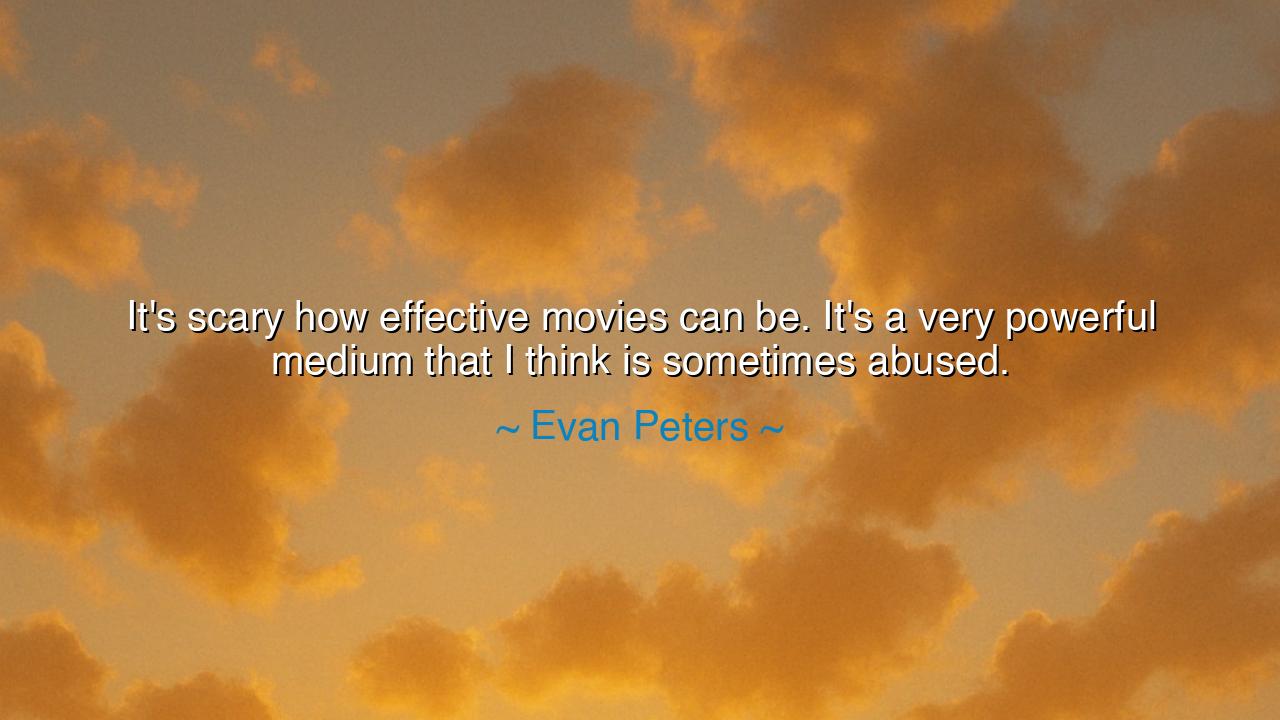
It's scary how effective movies can be. It's a very powerful
It's scary how effective movies can be. It's a very powerful medium that I think is sometimes abused.






Evan Peters’ words, "It's scary how effective movies can be. It's a very powerful medium that I think is sometimes abused," illuminate the immense power of cinema as a storytelling tool. Peters acknowledges that movies possess the capacity to deeply influence the emotions and thoughts of their audiences, making them one of the most effective forms of communication in modern society. His concern, however, is that this power is not always used for noble purposes. Just as any powerful tool can be used for both good and evil, cinema too has the potential to manipulate and mislead when in the wrong hands. In his words, there lies a cautionary tale about the responsibility that comes with wielding such influence.
In the ancient world, the power of storytelling was well understood. Homer’s epics, the Iliad and the Odyssey, were not just tales of gods and heroes; they were vehicles for passing on values, morality, and cultural beliefs. These stories, spoken aloud or written down, shaped how the people of ancient Greece saw themselves, their world, and the gods they worshipped. The impact of these stories was immense—how one portrayed heroism, honor, and fate in these works directly influenced how those ideas were perceived and acted upon in real life. Thus, the ancient storytellers held a profound responsibility to shape minds wisely, knowing that their words could inspire or deceive. In much the same way, movies today hold that same potent power over the collective psyche.
Plato, the ancient Greek philosopher, was particularly concerned about the influence of art and literature on the moral fabric of society. In his work, The Republic, Plato suggested that art, particularly poetry, could be dangerous if it presented false representations of the world and human nature. He feared that misleading portrayals could corrupt the minds of the people, especially the young. For Plato, the moral and educational responsibility of storytellers was paramount—art should not simply entertain, but uplift and educate. In the modern era, movies, like the epic poetry of ancient times, carry the weight of this responsibility. The power to sway opinions, emotions, and beliefs is immense, and as Peters suggests, it can be abused when filmmakers use this power to mislead or manipulate their audience.
Consider the advent of cinema in the early 20th century and how it was used by various governments for propaganda. During the Second World War, both the Allied and Axis powers utilized film to shape public opinion, boost morale, and demonize enemies. Movies like Leni Riefenstahl’s Triumph of the Will were masterpieces of cinematic technique but were also deeply manipulative in their portrayal of Nazi ideology. The ability of film to influence and distort reality for political ends was made painfully clear. This is an example of cinema being abused for a nefarious purpose—using its power to sway masses toward destructive ideologies, much as Plato feared in his time.
Yet, movies also have the power to heal and enlighten. The film Schindler’s List, directed by Steven Spielberg, is a profound example of cinema being used for good—not to exploit or manipulate, but to educate and remind future generations of the horrors of the Holocaust. Spielberg’s meticulous depiction of the atrocities faced by the Jewish people during WWII is a powerful call to action, urging people to never forget the past and to stand against hatred. It demonstrates how cinema, when wielded responsibly, can educate, inspire, and foster a deeper understanding of human suffering and justice. The difference between this kind of movie and one that is designed to manipulate lies in the intent behind the message and the impact it has on the viewer.
The lesson in Peters’ statement is clear: powerful mediums, like film, require great responsibility. Just as the ancient poets were held accountable for the messages they conveyed, so too should filmmakers today be aware of the impact their work can have on the minds and hearts of their audience. Movies are not just entertainment; they are a reflection of the culture that creates them, and they shape the world in ways that are both subtle and profound. The challenge is to use this power for good, to create films that elevate, educate, and inspire, rather than manipulate or deceive.
In your own life, remember the power of your voice, whether it is through art, words, or actions. Recognize that with great power comes great responsibility. Just as movies shape society’s beliefs, so too do your words and actions shape the lives of those around you. Approach your choices with integrity, knowing that what you put into the world has the potential to influence and impact others. Use your power wisely, whether in creating art, making decisions, or engaging with the world. In doing so, you will build a legacy of positive influence, just as the great storytellers of history have shaped the minds of generations.






AAdministratorAdministrator
Welcome, honored guests. Please leave a comment, we will respond soon